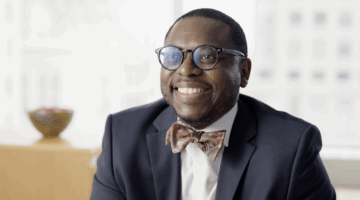Some liberals view Professor John Yoo as a sadist. They cite Professor Yoo’s involvement in the so-called “torture memos” during his time as a lawyer in the Justice Department’s Office of Legal Counsel.
But I think Professor Yoo is a masochist. Only a masochist would try to develop a citation-based system for ranking the relevance of law professors.
Relevant law professors? Yes, they exist!

How The Law Office Of Stephen L. Thomas Jr. Reclaimed Valuable Hours And Strengthened Client Care With 8am
Founded in 2017, the Baltimore-based Law Office of Stephen L. Thomas Jr. unified case management, communication, and payments with 8am—saving 10–20 hours a week for clients, trials, and growth.
Let’s learn about Professor Yoo’s ranking system and see who comes out on top. An added bonus: he also has a list of the top 50 most efficient law professors. Yes, law professors are efficient too!
Professor Yoo outlines his proposed ranking system in an article entitled The Cite Stuff: Inventing a Better Law Faculty Relevance Measure. He co-authored the piece with James C. Phillips, a graduate student at Boalt Hall, where Professor Yoo is a tenured professor — much to the chagrin of Berkeley liberals. Phillips, who’s pursuing a Ph.D. in jurisprudence and social policy at UC Berkeley, is actually first author.
Here’s how Professor Yoo describes his project over at Ricochet, in a post entitled Moneyball Comes to the Ivory Tower (love him or hate him, the man can come up with a catchy title):

Ready for What’s Next: 5 Ways to Strengthen Economic Resilience
Get five practical tips to spot cash flow red flags early, speed up payments, track spending in real time, and build stronger client trust through clear, transparent billing—download the ebook.
University professors have had the luxury of thinking they are influential without having any way to prove or disprove it — which means that everyone could be a big fish in their small pond. But suppose you were a university president, dean, or simply a rich donor. Could you deploy resources to attract undervalued professors and build a faculty that would punch above its salary? In other words, if Harvard is the Yankees, could you build a faculty like the Oakland A’s?
In our recent paper, a Ph.D student at Berkeley and I propose a way to measure faculty quality by counting up how many times professors are cited by other professors. This has been a controversial way to measure quality, but it is more objective than impressionistic opinions about who is smart and productive. In just a weekend, it has been downloaded at a faster rate than almost any other paper I’ve written — which may also tell you a lot about professors.
That last line is nicely self-deprecating. Law professors enjoy thinking and talking and reading and writing about… law professors!
This should come as no surprise. As one law professor recently confessed to us, “We take long vacations, eat out a lot, and study the insides of our eyelids frequently.”
The abstract — posted over at SSRN, where you can also download the full paper — offers greater detail about the Phillips/Yoo system:
[T]he most well-known [citation-based] metric for legal scholarship is the method used by Brian Leiter of the University of Chicago Law School and posted on his website. Despite the methodological rigorousness of the Leiter system, it suffers from some well-recognized limitations. It is biased in favor of schools with older, smaller faculties, for example, and against schools that do not produce as much peer-reviewed scholarship.
This study seeks to improve on earlier efforts by producing a more relevant and accurate citation-based ranking system. It produces a measure that explains 81 percent of the variation in the U.S. News academic peer rankings, implicitly revealing how schools could boost those rankings, and lists the most cited professors based on this new ranking methodology, both overall, amongst younger scholars, and in 20 areas of legal.
Oooh… a way for law school deans to manipulate improve their schools’ performance in the U.S. News law school rankings? Should we be at all surprised that this paper has been Professor Yoo’s most rapidly downloaded piece?
[The Phillips/Yoo system] allows for the top school in each area of law to be calculated, which could be useful to aspiring JD students who desire to know the best school in the area(s) of law they are most interested in. Finally, this study proposes an alternative faculty ranking system focusing on the percentage of a law school faculty that are “All-Stars” (ranked in the top 10 in citations per year in an area of law). This alternative ranking system improves upon some of the weaknesses of previous faculty quality ranking methodologies and argues that citation-based studies do measure something important – relevance of scholarship.
This should be catnip to legal-academic groupies. The lists are littered with major names.
UPDATE (5:10 PM): Several law professor friends of mine have pointed out a very important caveat to the rankings (noted on page five of te paper):
[T]his study is limited to full-time tenure-track faculty who are not clinical faculty, and is also limited to those professors on the faculty for the 2011-2012 school year. It only looks at the top 16 law schools according to the U.S. News and World Report’s academic peer rankings as databases are constantly updated and a citation study that stretches out over too much time will be biased in favor of the faculties done later in the study as the databases will have been updated and have more citations near the end of the period of gathering data.
As a result, many prominent and prolific professors who happen to work at schools outside the top 16 will not be included.
Let’s look at two of the rankings, the top 50 law professors for relevance and the top 50 law professors in efficiency….